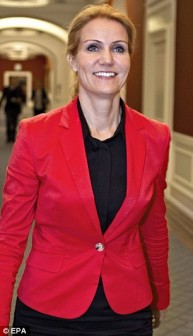COPENHAGEN (Reuters) – Denmark’s prime minister-elect Helle Thorning-Schmidt, began piecing together a disparate centre-left government today after an election which ended 10 years of centre-right rule in a voter backlash over the economy.

Financial markets generally took the election in their stride, having expected the result which could trigger extra public spending and higher taxes.
Danish newspapers, however, questioned how long a coalition led by the Social Democrat Thorning-Schmidt could last, noting sharp differences between parties in the “Red bloc” which range from mainstream centrists to the far-left.
These differences center on policies on pension reform, taxes and unemployment benefits plus immigration rules.
Thorning-Schmidt tapped voter anger about the state of the economy to take a relatively narrow victory yesterday and eject Prime Minister Lars Lokke Rasmussen from power.
It was the latest in a series of defeats for incumbent European governments.
Rasmussen formally handed in his resignation to the Queen, opening the way for Thorning-Schmidt to try to form a government and become Denmark’s first woman prime minister.
Thorning-Schmidt’s Red bloc will have a slim majority of five seats in Denmark’s 179-seat parliament. Turnout was a high 87.7 percent.
Commentators did not doubt her ability to forge a coalition government, but foresaw difficulties in making it work.
“With a parliamentary basis consisting of parties in deep mutual dispute over the most important questions in society, the election victory last night could turn out to be a short-lived triumph for Thorning-Schmidt,” daily Berlingske said.
One major complication is the fact the two biggest winners of the night were the far-left Red-Green Alliance and the centrist Social Liberals.
Both back Thorning-Schmidt but agree on little else. Thorning-Schmidt’s own Social Democrats actually lost ground and will be the second largest party after Rasmussen’s Liberals.
Denmark’s stock market was slightly lower, bucking the broader European trend, but traders said it was mainly due to specific stocks and not related to the election.
The crown remained strong, despite a cut in secondary interest rates on election day designed to soften the currency.
The economy will be the first task. Thorning-Schmidt’s platform included increased government spending, raising taxes on the wealthy and an unusual plan to make everyone work 12 minutes more per day — or an extra hour each week. Her group argues this would help to kick-start economic growth.
Denmark has been spared much of the trauma suffered by other west European countries because it remains outside the euro zone. This means it was not involved in bailing out debt-laden countries such as Greece, an issue that has stirred popular anger in neighbouring Germany.
But the economic crisis has turned Denmark’s healthy budget surplus into a deficit which is forecast to reach 4.6 percent of GDP next year.
Denmark is the latest European country where voters have thrown out incumbent leaders partly because of the economic crisis. Ireland, Britain, Portugal, Finland and The Netherlands have all had changes of government in the past year or so.
Spain’s Socialist government also faces possible defeat in a November 20 general election and German Chancellor Angela Merkel has lost a series of state elections since May 2010.
Denmark’s next prime minister is part of an extended European political family, married to the son of Neil and Glenys Kinnock. Neil was a European commissioner and British Labor Party leader, Glenys a European parliamentary deputy and Europe minister in the last Labour government in Britain.